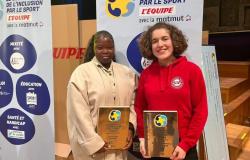From October 7 to 13, 2024, the Paris Bar, in partnership with the City of Paris, offered the “Lawyer in the City” operation. The Solidarity Bus, was part of the Paris Solidarity system, this bus was parked from October 7 to 11 at Place de la République. Volunteer lawyers provided free and confidential legal consultations to litigants in need. Reporting.
“What exactly is it?” », asks a curious gentleman in front of the bus marked “Lawyers” in 4 different languages and parked in the middle of Place de la République. The security guard, stationed in front of the machine, informs him. This Solidarity Bus allows litigants to benefit from free and confidential legal consultations. “Ah, that’s good, I have something to ask…” After having entered his name, this litigant will wait his turn and enter one of the three boxes, cramped but comfortable, where he can take his place in front of a volunteer lawyer. Installed behind sound curtains which ensure a significant degree of discretion, litigants can thus address points of law that cause them problems in their daily lives.
During these 3-hour shifts, each consultation lasts approximately 20 minutes. A fairly intense pace for the volunteer lawyers who receive up to twenty people. The rest of the year, other offices are open in Paris, general (Porte de Choisy, Porte de Clignancourt, Porte de Clichy, Porte de Montreuil), specialized in immigration law and asylum law (Porte d'Aubervilliers , Porte de la Chapelle), and others dedicated to victims of domestic violence.
An approach that gives meaning
“Within the Bar, the number of volunteers for the Bus does not dry up. Many lawyers join us regularly, whether they are lawyers who are just starting out, or employees of firms, and sometimes large firms,” explains Théodore Malgrain, responsible for coordinating the Bar association’s solidarity system, Paris Solidarité. However, a typical profile stands out: lawyers who have just set up shop, and therefore have more opportunity to manage their schedule than in a firm. Family law, labor law, housing law, foreigners' law, a little less criminal and consumer law, during these consultations, the subjects are varied. “Sometimes, more surprisingly, we have intellectual property or corporate law issues,” he explains.
Among the volunteer lawyers this Tuesday, October 11, we find Hana Ladhari. This is his first participation in the Solidarity Bus. “On the other hand, this is not the first time that I have done pro bono “. She has already done so in favor of unaccompanied minors (UMAs), for the AADH (Alliance of Lawyers for Human Rights), in favor of an American death row inmate or even in support of researchers who work on global warming. Last year, when she applied for the Bus, there were no more slots available. This year, she didn't want to miss her chance. “For me, it’s obvious to participate in this type of initiative. It's not a choice. We have to do it. In any case, that's my case: I was on a stock market, and in doing so, I give back a little to society what it gave me.” This associate in an American firm does civil and criminal litigation, including a lot of corporate law and compliance. She is “accustomed to training quickly on a legal issue”, whether it be the right to housing, consumer law or foreigners’ rights. In a few moments, she will get on the bus, settle in and receive her first person. Any apprehension? “No, because we are not alone. If I have a question, sisters or brothers will be around me,” she reassures herself.
Humanity, at the heart of lawyers’ missions
As she takes her seat on the bus, she meets Mélissa Cardoso, a volunteer lawyer for the Bus for several years. Self-employed, she regularly provides on-call services, as soon as her schedule allows, at Porte de la Chapelle for foreigners' rights or at Porte d'Aubervilliers. His primary motivation? The desire to “give legal advice to people far from law and justice”. It recalls this essential word contained in the oath of lawyers which enjoins them to fulfill their mission with “humanity”. His voluntary action took root at Action Against Hunger, Cimade and even for Amnesty International, despite “a significant workload”. Mélissa Cardoso mainly specializes in immigration law and asylum law. During her hours at the heart of the Solidarity Bus, she provides advice in these matters, in which she is an expert, but also sometimes in “family law, criminal law or housing law. As a general lawyer, you can also refer people to specialized services,” she explains. Among the most frequent requests she faces are “requests for information relating to OQTF (obligation to leave French territory), because people may be in irregular situations or wish to apply for French nationality”. At a time when the political context is chaotic, where far-right ideas are spreading, anxiety is rising among applicants. “We try to show as much empathy as possible,” she explains. But it must also have a discourse of truth. “I am very transparent with them. Anyone who has been in France for a year and a half and wants to obtain nationality, I prefer to tell them that it will not be possible. I am not pretending to be a situation that does not conform to reality.” Could this create a negative reaction? “People are able to listen to the advice of a competent and ethical lawyer,” she assures. If they are able to listen, they sometimes simply expect to be listened to, in an age of individualism as a rule. “A gentleman came earlier, he lives on the street and he had a question to ask. But above all he wanted to talk,” she illustrates.
Gabriela Greco de Marco Leite, lawyer at the Paris bar and in Brazil, collaborator, also speaks enthusiastically about these interventions. She became aware of the activities of the Paris Solidarité association a little over two years ago, and since then “she fell in love with it! “, she jokes. She participates in hotlines but also intervenes in help centers whose residents, even if they receive tremendous help from social workers, sometimes need more specific legal help. His morning at Place de la République went well but was intense. “I mainly had questions about immigration law, my favorite subject, and family law.” This is what she does in her daily life, with criminal law, family law and a little consumer and housing law. Joining the Solidarity Bar is in line with his vocation. “I have always liked subjects with the most human contact, that’s why I do this job. These initiatives correspond to my values as a lawyer,” she explains. And if it is not easy to reconcile your office files and the pro bonobecause certain periods are busier, “I don’t leave volunteering aside. I am lucky to have very understanding colleagues, who completely understand when I have to go on patrols or on duty.” Added to his already busy schedule, these volunteer hours are a breath of fresh air: “Often in my daily life, I have clients who can pay the fees. However, with the Paris Solidarité system, we encounter a very precarious public. We feel all the more useful.” She speaks with emotion of “the difference it makes in the lives of these people”: sometimes a few simple calls to the police station or court can “resolve a situation”.
A few days after her first intervention, Hana Ladhari gives her impressions: “It was great,” she exclaims. Classic questions of civil law, social law, “touching” moments when it came to the rights of foreigners or family law, she was able to discuss, in complete confidentiality, with litigants happy to have full or partial answers. less the beginnings of answers, and above all, delighted to have a privileged moment of listening. “I do not hesitate to redirect to specialized hotlines if necessary.” More accustomed to dealing with large groups or investment funds, she liked to focus on more day-to-day issues. “It’s great to come out feeling like you were useful,” she concludes. As soon as she left the Bus, she spoke about it to those around her, in her office, recommending everyone to try the experience for the next edition, which she already expects to happen. firm footing…






